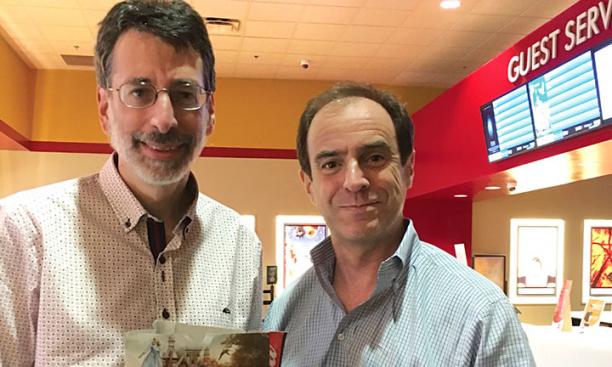

The U.S. government calls Edward Snowden a traitor, but many people consider him a hero, a case director Oliver Stone makes in his new film, Snowden. Snowden, the former CIA and NSA contractor who leaked classified information about government data collection programs to a selected group of journalists, including Barton Gellman ’82, remains a fugitive living in Russia. In another installment of PAW Goes to the Movies, senior writer Mark F. Bernstein ’83 invited Andrew Appel ’81, the Eugene Higgins Professor of Computer Science, to see the film and weigh in on the controversy.
MFB: What did you think?
AA: I thought it was a pretty good presentation of the issues and the man, but it’s a movie. It’s even an Oliver Stone movie, so you never quite know where the fiction begins.
Still, I’d say he got most of the big points right. For example, back in 2008, Barack Obama really did say that we should operate under the rule of law and the government shouldn’t illegally spy on people. Once he became president, he became a big defender of spying on everything and anything. I think that’s what happens when people become president.
MFB: How significant were Snowden’s revelations?
AA: As Stone showed, there were newspaper articles as far back as 2006 about the NSA’s bulk data collection programs. So when Snowden released his documents in 2013, there were very few surprises for people who had been following this issue closely. But what Snowden had was proof and the names of particular surveillance programs.
MFB: Did Stone take any liberties with the facts?
AA: There were some scenes that were clearly put in for dramatic purposes, like when Snowden is copying the government files and there was a window on his computer screen saying, you know, that the file was 90 percent downloaded. That might have been there if you or I were downloading a file, but someone with Snowden’s capabilities would have written a program so nothing would have looked out of the ordinary. Still, Stone needed it to create suspense for the audience.
MFB: Does Snowden deserve a pardon?
AA: I think he does. He has done a great service for this country. He is not the stereotype of the hacker. For example, Julian Assange, who founded Wikileaks, believes in dumping all secret documents he obtains onto the Internet for the whole world to read, and then the journalists can sort it out. Snowden chose to do things differently. Rather than release information indiscriminately, he very carefully contacted about half a dozen journalists in a few countries around the world, gave them he documents and said, make this information public but in a way that won’t put individuals at risk and won’t needlessly harm national security. I think the journalists he entrusted these documents to have done a pretty good job of following those guidelines.
MFB: You think Princeton might have appeared in the movie?
AA: In one of the last scenes, Snowden is being interviewed, as he often is, on a mobile video screen that has come to be called a “Snowden bot.” The interview is being conducted in a packed auditorium and they never say where it is, but there was an event just like that at the Friend Center last May. Bart Gellman ’82, who was one of the team of journalists who published Snowden’s documents, interviewed him. There are 250 seats in the Friend Center and every one was filled, as were another hundred or so seats in the overflow room. Just as in the movie, Snowden was amazingly articulate about why he did what he did and the principles involved.
MFB: Did you speak to Snowden personally?
AA: The day before Gellman’s public interview, Snowden held a private video discussion, also at the Friend Center, with about 20 technologists and security experts from around the world, in which I participated. He said, you guys are the experts, I didn’t even complete high school. He was very modest. But the experts were asking him about technical aspects of some of the things he had disclosed — this was a chance for him to chat with technologists for a change, instead of journalists. That was quite interesting.
MFB: How does Snowden stack up against some of the other tech movies of the last few years?
AA: The 2014 movie about Alan Turing [*37], The Imitation Game, completely distorted the relationship between Turing and his co-workers working on cracking the German codes, and took many liberties with the science. In Snowden, Oliver Stone came closer to an accurate portrayal, though clearly some things are fictionalized. But the movie about Facebook's Mark Zuckerberg, The Social Network (2010), was very interesting for how technically accurate they made it. Whenever they spout technical mumbo-jumbo in a scene, it’s totally accurate. You have to be a very compulsive director to insist on getting that right.